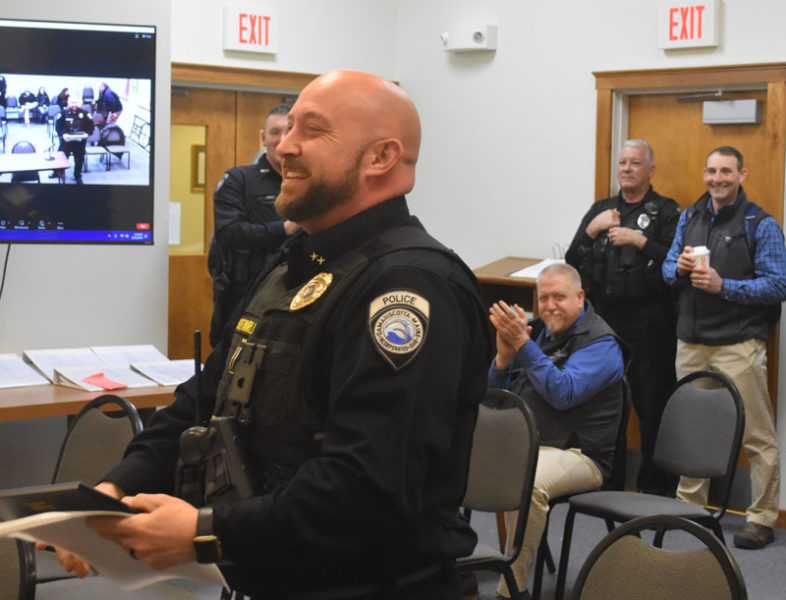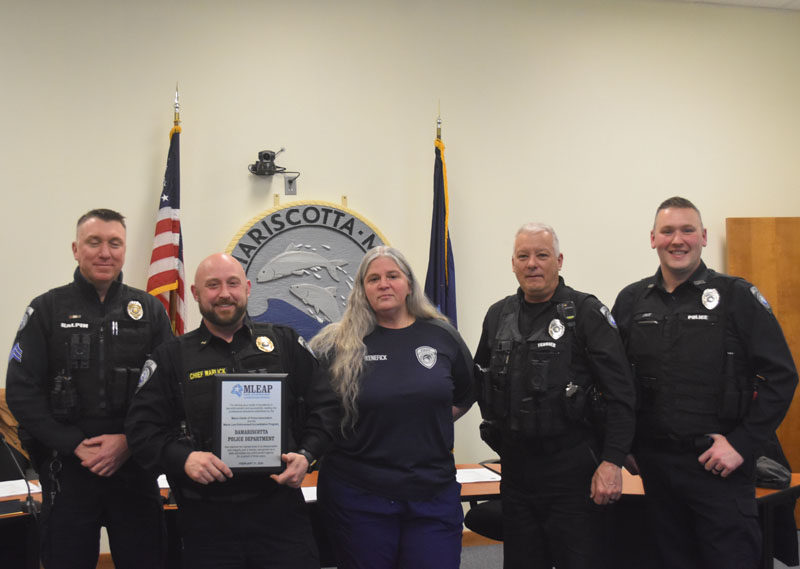
From left: Damariscotta Police Department Sgt. Erick Halpin, Hayden Warlick, Chief Jason Warlick, Officer Tyson Fait, and Officer Phil Tessier receive a plaque for the department’s new state accreditation on Wednesday, Feb. 21. Damariscotta is now one of 27 agencies in the state accredited by the Maine Law Enforcement Accreditation Program, a process that involves adopting best practice standards and policies developed by the program. (Elizabeth Walztoni photo)
After more than a year of work, the Damariscotta Police Department is accredited through the Maine Law Enforcement Accreditation Program, a voluntary process completed by less than a quarter of the state’s law enforcement agencies.
The recognition means the department has met best practice standards in all its operations, which town officials also said will reduce the potential for lawsuits and increase public access to information about how the department operates.
The accreditation was finalized in early January and recognized with an award from the accrediting agency at the Damariscotta Select Board’s Wednesday, Feb. 21 meeting. According to Cynthia Brann, law enforcement manager for Dirigo Safety, which administers the program, Damariscotta is the second accredited agency in Lincoln County following Boothbay Harbor.
Shawn O’Leary, representing the Maine Chiefs of Police Association, presented a plaque to Chief Jason Warlick with department staff and families in attendance. O’Leary said the set of 167 standards in 12 chapters was developed in 2017 to reflect best practices of smaller police departments in the state alongside with national standards.
“Maine does it the right way, but we need to prove to the community that Maine law enforcement is transparent and very professional,” O’Leary said.
To receive the accreditation, Warlick developed policies to meet these standards and trained staff on them before a professional review and an on-site assessment, according to O’Leary. The department had to meet every one that pertained to it.
Standards include administration and organization, professional conduct, training, personnel, records and information management, use of force, law enforcement operations, communications, and property/evidence management. According to O’Leary, the Damariscotta department is the 27th to receive accreditation out of roughly 130 law enforcement agencies in Maine.
“This is not an easy process,” O’Leary said. “(Accreditation) means they are a cut above the rest.”
It also means a 15% cut, or about $1,500, in the department’s liability insurance payments.

Damariscotta Police Chief Jason Warlick (left) receives a plaque recognizing the department’s accreditation through the Maine Law Enforcement Accreditation Program while fellow law enforcement officials applaud. After months in the works, the department received the recognition at the select board’s meeting Tuesday, Feb. 22. (Elizabeth Walztoni photo)
“This isn’t something that ends today,” Warlick said after accepting the plaque Feb. 21 with thanks to his staff and the town’s taxpayers. Standards are updated regularly, making compliance a continual process.
In a phone interview on Monday, Feb. 26, Warlick said the initial accreditation took over 18 months. It began to keep the department sharp and maintain morale while demonstrating leadership cares about employees, he said.
One result was increased public access to information about how the department responds to situations.
“I’m about transparency. I’m about ‘This is how we do things’ … if the community doesn’t like how we’re doing things, come in, talk to me,” Warlick said.
Policies, procedures, and training records needed to be submitted electronically to the accreditation program, Warlick said, pushing him to move information from three-ring binders six inches thick to online documents.
The department is also working to put policies online so the public can access them and understand their interactions with law enforcement. In the past, residents would typically obtain them through Freedom of Access Act requests. Four or five of the 90 policies will be kept private for safety reasons, but the rest are planned to go online, according to Warlick.
“If they feel as though they were wronged or something transpired that shouldn’t have … they can go on there and see what the policy says,” he said. “They pay my salary, they pay for our services, and they should know why we do what we do.”
Some updated areas for Damariscotta included responses to domestic violence calls focusing more on survivors, circumstances in which officers chase a motor vehicle, and how complaints from the public are approached. The handling and logging of evidence also changed substantially, according to Warlick.
Warlick read policies and made tests for the officers, who then had to study the material and pass the test before signing a document. Overall, the changes are designed to make the department run the same way as others across the state, including those in larger municipalities.
The accreditation has also been described as a preventative measure against lawsuits that would be costly to taxpayers down the road. Since he became chief in 2017, Warlick said the department has seen no formal threats of lawsuits and only one formal complaint against an officer, which was later retracted.
“My job is not just to protect staff; my job is to protect everybody,” he said. “If I’m not thinking about a lawsuit, I’m being naïve, and I’m not doing what the town is paying me to do. I’m also protecting against financial burdens … it’s entire protection.”
There hasn’t been an opening on the staff since 2017, either, according to Warlick. He credited that to community support from town administration and residents.
“I’d like to thank the citizens and the select board and everybody that’s involved in keeping us going, and giving us the positivity and encouragement they’ve given us,” he said. “It’s because of them.”
For more information about the accreditation program, go to dirigosafety.com.

From left: Damariscotta Police Department Sgt. Erick Halpin, Chief Jason Warlick, Administrative Assistant Joanna Kenefick, Officer Tyson Fait, and Officer Phil Tessier receive a plaque for the department’s new state accreditation on Wednesday, Feb. 21. (Elizabeth Walztoni photo)



